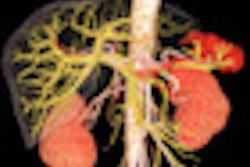Dear AuntMinnieEurope Member,
Increasing attention is being given to radiation dose monitoring, and experts believe PACS has a key role to play in this area. Most new imaging devices can output radiation dose information in a standard DICOM format -- RDSR, or radiation dose structured report -- and there are also ways to deal with old devices that are not RDSR-compliant.
The topic was addressed in detail at the recent U.K. Informatics Group Meeting in London. Our regular columnist, Dr. Neelam Dugar, was there and she tackles the subject in her latest article. Visit our Healthcare Informatics Digital Community, or click here.
Several artists have drawn inspiration from medical imaging, but I don't recall any fashion designers making use of x-ray and CT images. Now a radiographer has developed a range of clothing influenced by everything from the different opacities of CT scans to the geometry of x-ray calibration films, often with a focus on brain imaging. Get the story here.
Too many patients are being overdosed, overtreated, and overdiagnosed, according to a group of international authors who think it's time to reassess the use of diagnostic tools. This looks set to increase the need to justify an imaging examination. Click here to find out more.
The value of breast cancer screening has come under particular scrutiny over recent months -- not least due to worries over radiation dosage from x-ray mammography and the diagnostic limitations of the standard procedure -- and the search for a new technique is gathering pace. To learn more, visit our Women's Imaging Digital Community, or click here.
MR elastography measures the properties of tissues through low-frequency waves that induce stress, and can help distinguish between malignant and benign liver tumors. Researchers from Paris now think the modality can be used to evaluate the shear properties of the tissues. Go to our MRI Digital Community, or click here.
Interoperability is a buzzword in healthcare IT today, but to be meaningful it requires strong political support, increased awareness, and pockets of best practice, according to Catherine Chronaki of Health Level Seven (HL7). Read more here.



















